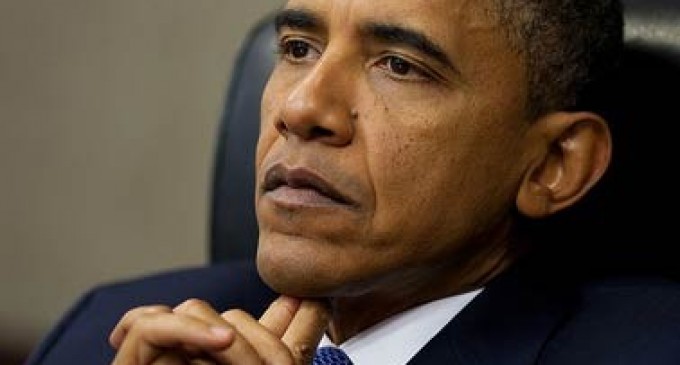
In a recent speech at a town-hall meeting in Nashville, TN, Obama admitted that that without new legislation it would be technically easy to undo his actions that will grant amnesty to millions of illegal immigrants, but that it’s highly unlikely that the next President would do so, lest they face great political risk.
Even though the majority of Americans are against his executive amnesty, Obama believes that because Americans have a big heart they will ultimately support his illegal actions.
Does Obama really feel that because us Americans are so ‘sweet and nice’ that we will allow him to destroy the last vestiges of our Republic by allowing it to be overridden with non-English speaking Democrats that will suck up taxpayer monies through free rides on the welfare train?
Or does Obama simply know he will be the next President?
Page 2 for more + video:

Can’t wait for this arrogant p***k to be gone!
Delusional moron!!!
Boy— you’re in for a BIG surprise
Hahaha hehehe. Wanna bet!!!!
Open mouth, insert barrel ,put trigger…
You are sadly mistaken if you think a real president won’t make things right. LOL
Hide and watch Hussein.
Think again.
Obama has fulfilled every doubt and fear from the few who hesitantly voted for him and all who never voted for him. At this point he has become the American political nightmare no one could have ever imagined.
Donna Bennett , Here we go again !…..There are 2 laws that prohibit Muslim/Islam Immigration to the U.S.A. !!! & their still on the books & being ignored by 4 oval office sitters !!!!!———–>#1.—->Immigration Act of 1907
The Law: Federal legislation regulating immigration
Date: Signed into law on February 20, 1907
Significance: This law created the Dillingham Commission to collect data used in future immigration laws, further narrowed Asian immigration, limited Muslim immigration, and expanded the definition of undesirable women immigrants.
In 1905, amid continuing concerns over increased immigration, President Theodore Roosevelt called upon the U.S. Congress to increase protection from unwanted immigration, especially in the nation’s largest cities, and to codify earlier legislation. Roosevelt and Congress sought to exclude immigrants who would not make good citizens. In February, 1907, Congress passed a new immigration act that expanded previous immigration restrictions by prohibiting Asians from entering the United States through the territory of Hawaii, doubled the immigration head tax to four dollars per person, broadened the excludable classes of immigrants to include contract labor and subversive and presumably immoral groups, and required ships to allow minimum amounts of deck space for each passenger and to provide manifests of their departing aliens.
Section 39 of the new law created the U.S. Immigration Commission—better known as the Dillingham Commission—to investigate immigration problems and their impact on the nation. The commission provided detailed reports to future Congresses regarding the need for refining immigration laws. The commission called on Congress to put the economic well-being of U.S. citizens above the needs of corporations that relied heavily on uneducated immigrants for cheap labor. The commission also favored further limiting immigration, implementing an alien literacy test, and continuing the Chinese exclusion policy and restricting Japanese and Korean immigration. The commissioners argued that Congress should limit the admission of unskilled aliens and implement a quota system.
The Immigration Act of 1907 was notable for several key innovations regarding immigration policy. Section 12 required ships with alien passengers departing the United States to provide complete lists of their passengers by name, age, sex, nationality, occupation, and place of residence in the United States. The information gathered through this law provided the first statistical documentation on alien departures. To combat the practice of polygamy and the keeping of concubines, the act expanded on the Immigration Act of 1891, which denied entry to polygamists, to include any persons who espoused these practices. The Ottoman Empire viewed these provisions as an attack on Islamic religious practices.
Women were a particular target of the 1907 law, which broadened the definition of prostitutes to include women arriving in the United States for any immoral purposes. The vague language of the law was used to exclude women in arranged marriages, especially those of Asian origin, and allowed for their deportation. Responding to concerns of progressive reformers, the act tightened laws targeting immigrant women suspected of being recruited to work as prostitutes. It also permitted the deportation of women who lived in known houses of prostitution or who had practiced prostitution within three years of their entering the United States. This was the first statutory provision authorizing deportation based on criminal conduct within the United States.
Linda Upham-Bornstein